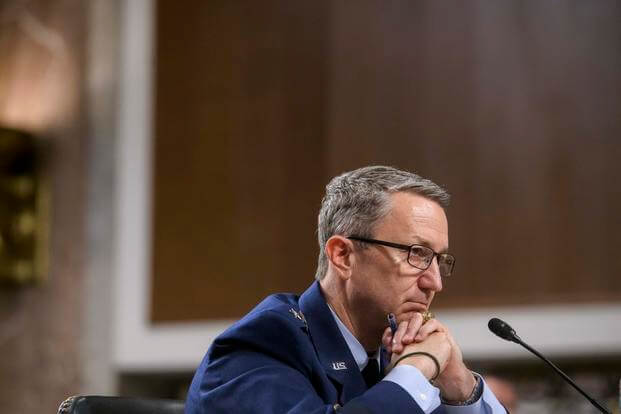Hegseth Restarts Resignation Program in Effort to Cut More Civilian Pentagon Jobs

Defense Secretary Pete Hegseth has again started pushing for deferred resignations and early retirements among Defense Department civilian workers as he seeks to slash 50,000 to 60,000 jobs -- 5% to 8% of a workforce that includes thousands of veterans.
Hegseth signed a memo Friday to restart a deferred resignation program that emerged out of billionaire Elon Musk's "Fork in the Road" email, which went out to all federal employees in late January and offered them a chance to walk away from their jobs while still getting paid until October.
The memo said the Defense Department, the largest federal agency, was giving those employees the chance to voluntarily leave instead of being fired later. The resignation offers are meant "to maximize participation so that we can minimize the number of involuntary actions that may be required to achieve the strategic objectives," Hegseth wrote in the memo that was publicly released Monday[1].
Read Next: House Republican Pushing for Tax Exemption for Military Bonuses to Be Included in Trump Agenda Bill[2]
Musk, the world's richest man, and President Donald Trump have spent the first months of his administration firing huge swaths of federal employees -- including Department of Veterans Affairs[3] workers, IRS personnel, weather forecasters and health care workers -- and dismantling agencies across the federal government without the consent of Congress. The moves have caused chaos, public outrage and a deluge of lawsuits.
The defense secretary has been focused on cutting jobs in the Pentagon from his first days in office and, until recently, was personally involved in some of the decisions surrounding which employees could stay or go.
"As the secretary made clear, it is simply not in the public interest to retain individuals whose contributions are not mission-critical," Darin Selnick, the man who was performing the duties of the under secretary of defense for personnel and readiness, said in a February memo announcing an effort to fire 5,400 probationary employees[4]. Selnick has since become Hegseth's deputy chief of staff.
The Trump administration's mass firings of probationary employees at the Pentagon and elsewhere were temporarily halted by the courts[5], which found legal issues with the terminations and ordered that the employees return to work.
With mass firings on hold, the Pentagon has begun focusing on voluntary resignations to dramatically reduce the number of civilian employees, who provide a wide range of services across the department.
Two weeks ago, a senior defense official told reporters that -- between the firings, a hiring freeze also ordered by Hegseth, and the resignation program -- resignations were far and away the most successful at getting employees off the Pentagon's books.
The official told reporters that, at the time, the department had "approved more than 20,000 ... nearing 21,000 of the applications from employees that volunteered."
By contrast, the firings and hiring freeze have not only raised legal challenges but become a source of constant scrutiny for the Pentagon as it has laid off or fired employees who turned out to be necessary.
Military.com was the first to report that, as part of these cost-cutting and firing efforts, the Pentagon halted programs that administered the military recruiting exam[6] -- a key step in getting people into the military -- at remote locations and inside high schools.
A week later, on March 14, the military reversed its decision[7] and brought all the impacted civilians who ran the programs back off furlough.
A memo, written by Selnick's successor, just days after that about-face, specifically exempted jobs at military entrance locations[8] from the hiring freeze. However, despite these carveouts, services across the military have continued to be impacted.
Last week, Hill Air Force Base[9] in Utah was forced to close one of its two day care centers[10] as a result of the hiring freezes, despite the fact that child care center staff were exempted from the job cuts.
By returning to a program that incentivizes resignations, it seems that Hegseth is hoping to find thousands more employees willing to leave their jobs, enabling officials to then simply close those positions once they are vacant.
Hegseth will then use the funding from those jobs to offer "increased resources in the areas where we need them most." Neither Hegseth nor the Pentagon has disclosed what positions they deem unnecessary; what areas are in need of more resources; or which employees are leaving, despite promises to be transparent.
The offer to civilians did not seem to address any specific areas or jobs in the department, meaning there appeared to be no effort at targeted reductions. The memo released Monday noted that both the deferred resignation and early retirement offers were available to all Defense Department civilians -- about 760,000 civilian employees total[11] -- and "exemptions should be rare."
The latest memo also claimed the effort is "not about a target number of layoffs," even though Selnick's statement in late February that kicked off the job cuts said that the goal was to reduce the number of civilian employees by 5% to 8%.
Pentagon officials have also not offered any response to the job cuts disproportionately affecting veterans -- more than 30,000[12] are employed by the Pentagon.
"Within the military, there are times where you see that individuals will leave service when their services are no longer directly in the nation's interest," the senior official told reporters two weeks ago. "The same thing is true in the civilian side, and some of those people will be veterans that served in uniform previously."
Related: Pentagon Pushes Ahead on Cutting 60,000 Civilian Workers Using Firings, Resignations and Hiring Freeze[13]
© Copyright 2025 Military.com. All rights reserved. This article may not be republished, rebroadcast, rewritten or otherwise distributed without written permission. To reprint or license this article or any content from Military.com, please submit your request here[14].
